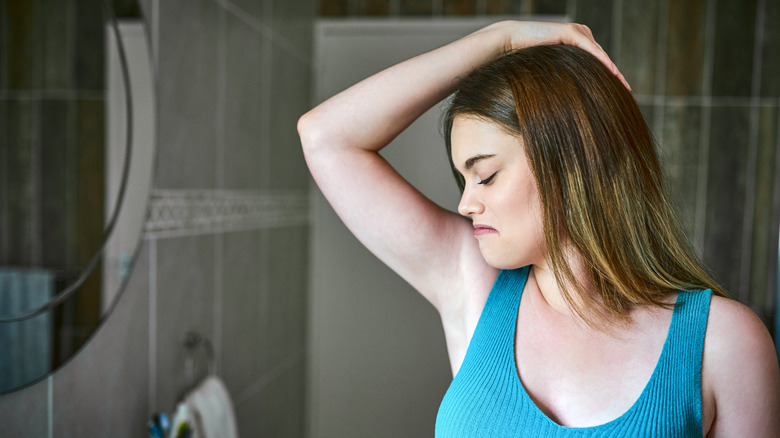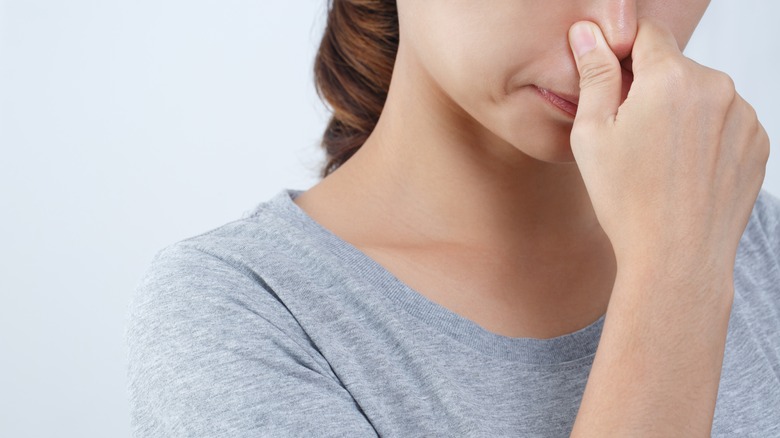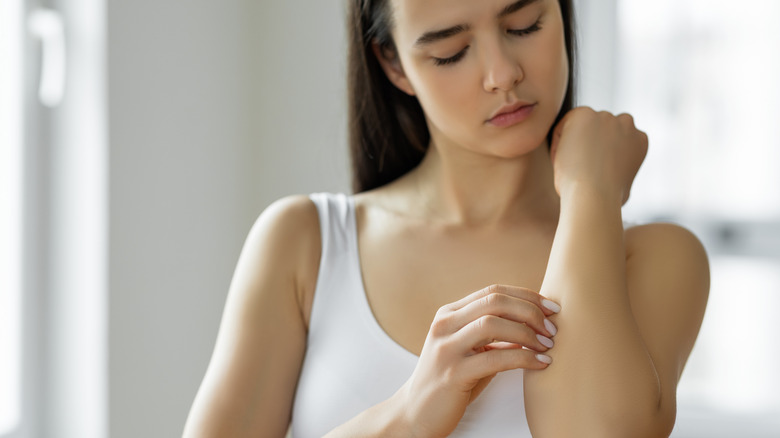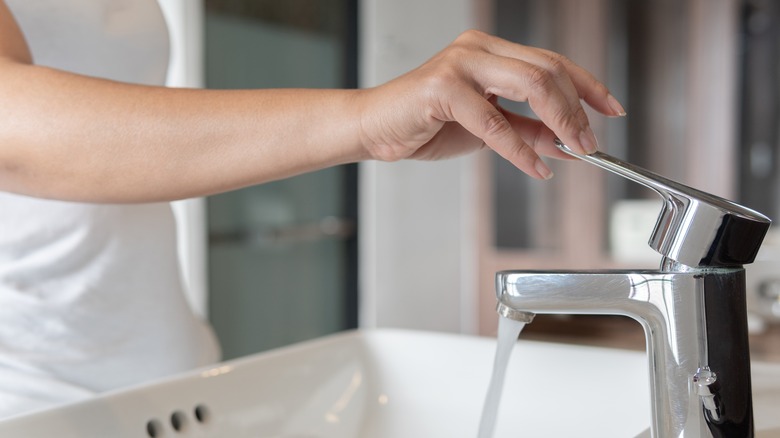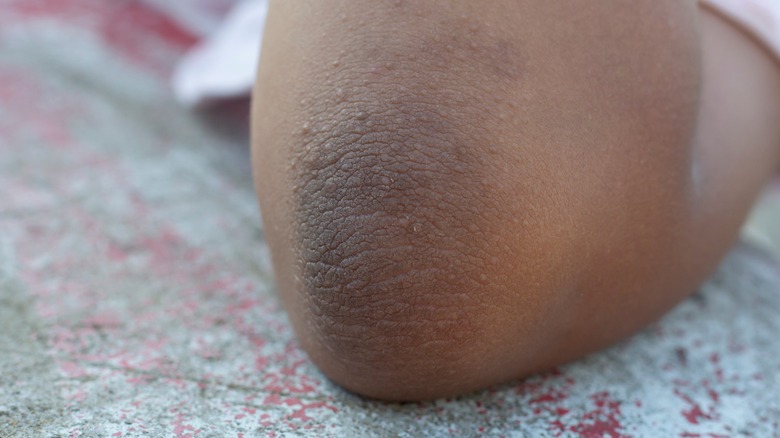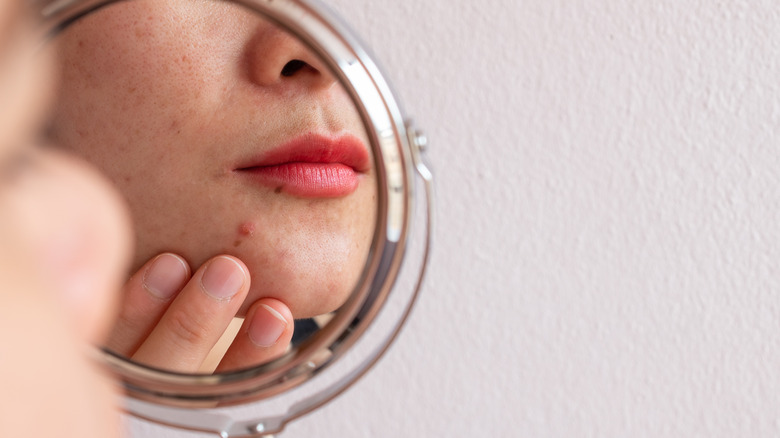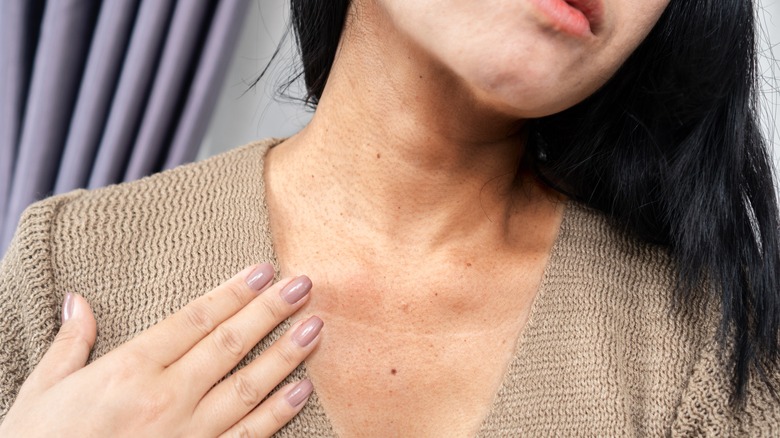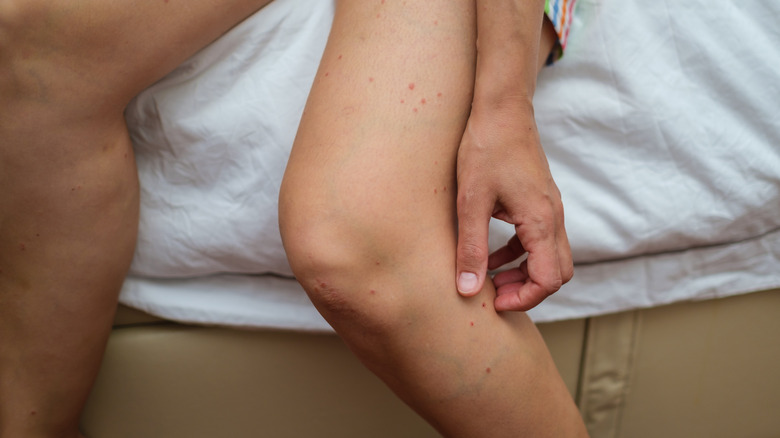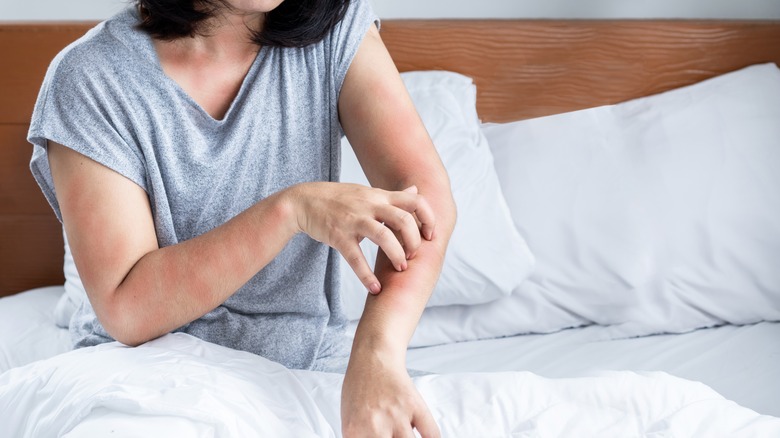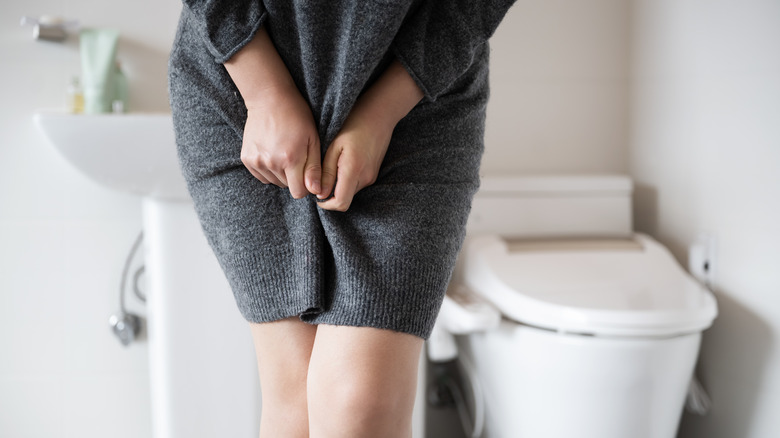Here's What Would Happen If You Stopped Showering
As we grow up, most of us are all taught about personal hygiene. From washing our hands after using the bathroom, brushing our teeth and caring for our nails, While the frequency and methods may vary across cultures, many would agree that a shower per day is enough. It's estimated that at least two-thirds of people in the U.S. take one daily shower, with some studies estimating nearly half of these individuals choose to do so in the morning rather than at night. Those who exclusively shower before bed, meanwhile, makeup roughly a quarter of the U.S. population.
Of course, there is a subset of experts who have argued that the one-shower-a-day logic is unnecessary. Speaking on an episode of the podcast "Margin of Error," Dr. Todd Kobayashi said that individuals who spend time at home probably don't need to shower every day since they're not being exposed to as much dirt. However, others have taken things a step further. Dr. James Hamblin, author of "Clean: The New Science of Skin," claims it may not be necessary at all. "We are told by marketing, and by some traditions passed down, that it's necessary to do more than it actually is," he told NPR in 2020. "Your health will not suffer. And your body is not so disgusting that you need to upend your microbial ecosystem every day."
However, what would actually happen if you did stop showering for good? Would this negate any effort to maintain good personal hygiene entirely? Well, as is the case with a lot of things, there are definitive pros and cons to eliminating your regular bathing ritual.
You may develop an odor
Smelling bad might seem entirely too obvious a side effect of not showering, but it is an important one to note, as scent can often indicate that something is wrong. Though it may take some time for a smell to show up on the body, especially if you're still using deodorant, according to Dr. Angela Lam, a person's hair can develop a mildew smell in as little as a few days of not washing it (via USA Today). Then, after a couple weeks of consistently not bathing, your skin will have built up an excess of dead skin and bacteria. When that mixes with sweat, it produces an unpleasant odor that neither deodorant nor perfume can overcome.
However, some researchers, like Hamblin, have argued that for some people, this effect may be temporary. Speaking to Well and Good about his own journey of giving up showering, he said, "[...] After a while, the idea goes, your ecosystem reaches a steady state, and you stop smelling bad. I mean, you don't smell like rosewater or Axe Body Spray, but you don't smell like BO, either."
Excess dead skin collects, increasing your infection risk
Now, we know that an accumulation of dead skin cells combined with sweat can create unpleasant odor. However, this is not the only issue that can arise. A build up dead skin cells can cause inflamed red patches on your skin, causing itchiness and irritation. In order to avoid all of this, it is recommended that people exfoliate their skin at least once a week.
Over time, as dead cells and bacteria collect on the skin, it can put you at risk for contracting an infection. If you happen to get a cut or wound, you're then exposing it to all of those germs that have collected on your body. Fungi and staphylococcus bacteria can wreak havoc on your body and lead to some serious health complications when they come into contact with your bloodstream. Per Minnesota Department of Health, some potential risks include includes cellulitis and other blood infections. These can cause uncomfortable symptoms like diarrhea, fever, and chills. Meanwhile, infections like Clostridium difficile, which live on the skin and easily spread via physical contact, are capable of causing life-threatening damage to your colon. In order to keep your skin healthy, it is recommended to clean the body with warm water and a mild soap. , "[R]egular body hygiene is important to prevent overgrowth of microorganisms on the skin," Dr. Joshua Zeichner, dermatologist tells Refinery 29.
You'll save on your water bill
While there are numerous, easy ways to conserve water, cutting back on showering is one of the easiest ways to significantly cut down on water consumption. According to the Alliance for Water Efficiency, showers make up for approximately 19 percent of a person's total water use, at "11.1 gallons used per capita per day."
Reducing your water consumption by 20 percent is definitely significant, but you can still do so without completely eliminating showers from your day-to-day routine. Limiting your shower time to under five minutes can also make a difference. Per My Day Night Plumber, this change could save you up to $100 on your water bill every year. Meanwhile, installing a low-flowing shower head can potentially prevent you from wasting an additional 2,7000 gallons of water annually.
You could develop dark patches on your skin
You may be surprised to learn that there is a specific skin condition related to an insufficient level of personal hygiene,called dermatitis neglecta. According to the National Library of Medicine, dermatitis neglecta, by definition, is "a condition that results from inadequate frictional cleansing leading to accumulation of corneocytes, sebum and sweat ultimately resulting in hyper-pigmented patch or verrucous plaque." This can cause dark, scaly patches of skin to form on your body that may also feel rough and irritated to the touch. Although unlikely to appear from the occasional skipped shower, dermatitis neglecta, which looks like dirt, can show up on the body after several weeks of not bathing, making you feel itchy and uncomfortable.
Fortunately, dermatitis neglecta is fairly easy to treat if you ever develop the condition. All one has to do to treat and keep this skin condition at bay is to maintain good hygiene practices—including regular showering. However, more serious cases may require more invasive treatment with a salicylic acid cleanser and a moisturizer to aid with dryness.
Acne may become a problem
Just as there's a risk of unpleasant odor, there is also an increased chance that the build up of dead skin cells and oils on your skin can cause acne. On the other hand, people who shower excessively, and with very hot water, are also prone to developing worsened acne, as this can dry out you skin and trigger sebum production. To maintain balance where your skin is concerned is to have a regular hygiene routine that includes showering, with a recommended two to three times a week for most people who would prefer not to shower daily. Of course, this is not an exact science, so you should proceed with a number that works well with your lifestyle.
It may help alleviate certain skin conditions
While skipping your daily shower might exacerbate certain skin conditions like acne vulgaris, it may potentially improve or help to treat other ones. According to Well + Good, some people who give up showering report that their skin starts to feel softer without the use of lotion. This is likely due to the fact that most commercial soap strips the skin's natural moisture barrier. Meanwhile, according to The Guardian, some experts have hypothesized that taking less showers could help with eczema, a condition that causes dry, and sometimes painful, inflamed patches of skin. However, research shows that individuals with eczema are more likely to see relief by sticking to a daily bathing routine. For this reason, some experts instead advise those people spend less time in the shower, rather than give up bathing entirely.
Of course, if you have any kind of skin condition and are considering making a drastic lifestyle change such as eliminating showers, you should definitely consult your physician or dermatologist in order to determine if this will alleviate or aggravate your condition.
You may develop ringworm
It seems that there are at least several levels of skin conditions that can affect or infect you if you decide to stop showering completely. If we took these levels and put them into a sort of game format, developing fungus or a fungal infection on your body from not showering might be the final boss of this potentially stinky game. By not showering, you could leave your body extra vulnerable to contagious fungal infections like ringworm or athlete's foot, which can be contracted through your skins contact with other people or surfaces that has been touched by an infected person.
Although generally painless and easily treatable, ringworm that spreads can lead to complications like permanent scarring or dark marks. It can also cause secondary infections if you get a cut near the affected area.
The sensation of not showering could become unbearable
Have you ever gone to the gym or played a sport, sweat profusely, then did not have time to shower or bathe afterwards? Usually, this is not the most pleasant feeling, and for most people, can be easily remedied with a shower. However, if you stop showering, all of the unpleasant elements and sensation associated with that, including strong or foul body odour, excessively dry or oily skin, possible skin irritation, and even a visible dirt line, which can reveal which parts of your body you have not be actively cleaning, can leave you feeling uncomfortable, irritated, or even insecure as you move around society in your daily life. If showering regularly can help you to feel more presentable or even more comfortable in social situations, it seems advisable that you refrain from eliminating this from your daily routine, as it can help you tackle your day with confidence.
You may have more bad hair days than before
When you think of a bad hair day, you might be referring to a moment when your hair texture isn't cooperating with the weather outside or your styling techniques. If you decide to stop showering, however, you may find that your hair issues far exceed that of frizz on a humid or rainy day.
Your scalp, much like the skin on the rest of your body, is susceptible to accumulating oil. And if you decide to forego showering for several days or more — and by that extension, washing your hair, you may start to notice that your hair looks greasy and weighed down. For people who have hair that is already the oilier side, it may take as little to two days or two skipped showers to notice this change.
Although these effects may seem benign and temporary, over time, if you continue to forego showering, it could potentially impact your hair health long term. If you're dealing with a condition like androgenic alopecia, this excess oil can actually impact your scalp's microbiome and worsen symptoms like hair loss. But even if you don't have a particular scalp condition, not showering may still impede your hair's ability to grow strong and healthy. To prevent any issues, experts recommend washing at least twice a week, depending on your hair texture.
You may develop problems in your groin area
Much like the rest of your body, your groin is not exempt from developing issues if you don't keep up with a regular hygiene routine. One of the more uncomfortable ailments you can develop is an inflammatory skin condition called intertrigo. Though normally caused by excess friction and trapped moisture from sweat, not showering can aggravate the condition and make it worse, causing itching, burning, and sensitive skin. On top of that, over time, as moisture collects on the skin and is left uncleaned, it creates the ideal environment for fungus like candida to thrive. This can lead to yeast infections, which can cause itching, rash, painful intercourse, and a thick, white discharge. Although this condition is more common in people with vaginas, it can affect individuals with penises as well.
